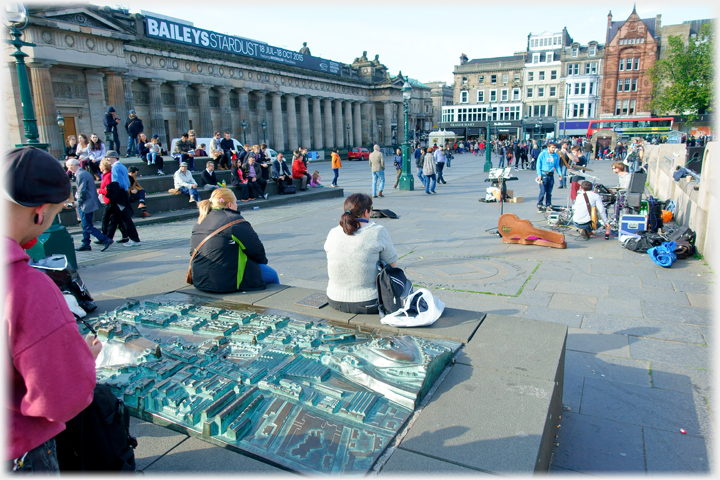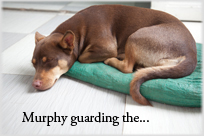
Which Reality?
Which reality? This reality, that reality. The void, the astroid?
Gerome Ragni and James Rado (1967)

Instead of constantly expending large amounts of energy on processing incoming sensory signals, the bulk of what the brain does is learn and maintain a kind of model of body and world - a model that can then be used moment by moment, to try to predict the sensory signal... [This model] is constructed from mixtures of expectation, attention, and sensory stimulation, it will never be possible to experience either the world or your own body “as it really is.” Indeed, it rapidly becomes unclear what this could even mean.
Andy Clark (2023)

This model of central Edinburgh sits in central Edinburgh; so, standing there, you could compare the two, and ask if the model was good. When Claude, in the musical Hair, asks ‘Which reality?’, he is using ‘reality’ as I just used ‘model’, as though such comparison was possible. Clark, and importantly
Gray prior
 Gray published his book covering very similar ground in 2004. To a page introduces his work.
to him, use ‘model’ to mean what is going on in our heads, which is the source of all perceived ‘reality’, and producer of all models, including itself. If we want to compare ‘reality’, to that of which it is a model, we would have to leave our heads behind. We can have no access to things ‘as they really are’, if that means independently of our mental workings: we cannot conceive of a
View from Nowhere,
Gray published his book covering very similar ground in 2004. To a page introduces his work.
to him, use ‘model’ to mean what is going on in our heads, which is the source of all perceived ‘reality’, and producer of all models, including itself. If we want to compare ‘reality’, to that of which it is a model, we would have to leave our heads behind. We can have no access to things ‘as they really are’, if that means independently of our mental workings: we cannot conceive of a
View from Nowhere,
 Another approach to the area is to consider how anything can be seen, without having a position.
let alone a god’s
eye view.
Another approach to the area is to consider how anything can be seen, without having a position.
let alone a god’s
eye view.
 Once we get to these levels of abstraction, rather little can be said about anything.
It is a difficult point which Kant helped us
grasp.
Once we get to these levels of abstraction, rather little can be said about anything.
It is a difficult point which Kant helped us
grasp.
 A page saying rather little about Kant’s suggestion concerning things in themselves.
Clark, a philosopher, and Gray, a neuropsychologist, both understand the problem, and rightly see Claude’s question cannot be about reality, in the sense of the totality of experience.
A page saying rather little about Kant’s suggestion concerning things in themselves.
Clark, a philosopher, and Gray, a neuropsychologist, both understand the problem, and rightly see Claude’s question cannot be about reality, in the sense of the totality of experience.
The quote is a line spoken by Claude, the lead in the musical Hair, which was written by Ragni and Rado who had met while acting together three years previously. It was first performed in the autumn of 1967, the quote is taken from track 4 side A of the L.P. Fresh Hair issued by Polydor (2371-066) in 1970. Clark’s suggestion of ‘Predictive Processing’ is outlined with clarity and enthusiasm in his book The Experience Machine published by Penguin, the quotes are from pages 9 and 55. The ‘Comparator Hypothesis’ of Jeffrey Gray was explained in his book Consciousness: Creeping up on the Hard Problem, which was published by Oxford and has a more thoroughgoing explanation of a similar idea.
The photograph was taken beside the Scottish National Gallery, at the foot of the Mound, in Edinburgh
Above, hovering on blue introduces a link: click to go, move away to stay.

Saturday 26th April 2025
 ...guide to this site
...guide to this site